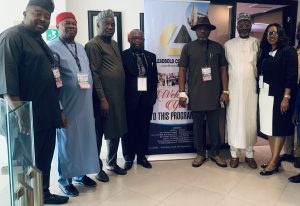Senate Seeks Transparency, Accountability to Strengthen Nigeria’s Public Procurement System

The Senate has called for stricter compliance and greater transparency in Nigeria’s public procurement system, insisting that every naira spent must translate into measurable development outcomes and improved public services.
Chairman of the Senate Committee on Public Procurement, Senator Olajide Ipinsagba (Ondo North), made the call at a two-day retreat organised by LeadBold Resource Consulting with the theme “Global Regulations and International Best Practices for Monitoring and Compliance in Public Procurement” held at Fraser Suites, Abuja.
Senator Ipinsagba described public procurement as not merely a technical process but the mechanism through which government policies are converted into tangible infrastructure, services, and national development.
He noted that while the enactment of the Public Procurement Act 2007 and the establishment of the Bureau of Public Procurement (BPP) had strengthened due process and accountability, further reforms were necessary to align Nigeria’s procurement system with global standards.
“Public procurement is a continuous process of evolution, adaptation, and learning,” he said. “The Committee remains committed to legislative oversight, policy advocacy, and reforms that make Nigeria’s procurement practices a model of transparency not only in Africa but globally.”
The senator outlined key priorities for reform, including the digitisation of procurement processes, stronger compliance monitoring, capacity building for procurement officers, and deeper public and civil society participation through open contracting standards.
He emphasised that public spending must reflect value for money in line with President Bola Ahmed Tinubu’s Renewed Hope Agenda, adding that the Committee would continue to push for policies that guarantee efficiency and integrity across all Ministries, Departments, and Agencies (MDAs).
“Let the work that Mr. President is doing and the money being spent translate into good roads, better healthcare, improved education, and modern infrastructure. That is what we stand for,” he said.
The lawmaker also warned that the Committee would not hesitate to recommend the suspension of procurement activities in MDAs that fail to account for previously allocated funds.
“If they cannot account for the money already spent, there is no need for them to spend more,” he stated. “Accountability must precede new spending as provided in the Public Procurement Act of 2007.”
In his remarks, Barrister Kelechi Kingsley, Chief Executive Officer of LeadBold Resource Consulting, said the retreat was designed to strengthen the institutional capacity of the Senate Committee in promoting transparency and compliance in public procurement.
“This retreat is more than an event; it is a leadership engagement aimed at empowering legislators with the knowledge and tools to enhance oversight, accountability, and institutional integrity,” Kingsley said.
He described the theme as timely, noting that aligning Nigeria’s procurement system with international standards was essential to curbing corruption and improving efficiency in public spending.
“At LeadBold Consulting, we believe that strong institutions are built by empowered leaders who are ethical, informed, and courageous enough to demand accountability and deliver excellence,” he added.
Also speaking, Senator Diket Plang (Plateau Central), Member of the Committee, commended the retreat’s impact and called for periodic training for lawmakers to deepen their understanding of the Procurement Act and oversight responsibilities.
“You cannot carry out effective oversight if you don’t understand what the law says,” he stated. “This retreat has exposed knowledge gaps and reinforced the need for continuous engagement. Such capacity-building sessions should be held regularly for all committees of the National Assembly.”
Senator Plang said the Public Procurement Act was designed to promote fairness, ensure value for money, and guarantee accountability in government contracts. He urged continuous review of the law to close existing gaps and enhance its implementation.
The retreat featured technical sessions and discussions on global procurement frameworks, compliance monitoring, and digital transformation strategies aimed at positioning Nigeria’s public procurement system as a model of transparency and efficiency.
